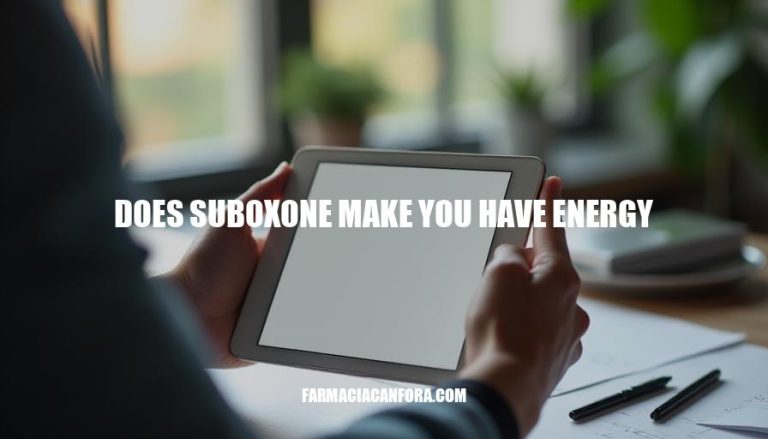


Suboxone is a medicine that helps people with opioid addiction. It has two parts: buprenorphine and naloxone. Buprenorphine helps manage withdrawal symptoms, while naloxone stops the effects of other opioids.
Suboxone can cause side effects like headaches, nausea, and dizziness.
Suboxone, a combination of buprenorphine and naloxone, is primarily used to treat opioid use disorder (OUD). Its impact on energy levels has been a subject of interest among both patients and healthcare providers. Scientific studies and medical opinions provide insights into how Suboxone might influence energy levels, both positively and negatively.
Suboxone’s mechanism of action involves binding to opioid receptors in the brain, particularly the mu receptors.
Buprenorphine, a partial opioid agonist, produces pain relief and a sense of well-being, while naloxone, an opioid antagonist, prevents misuse and abuse. This combination helps individuals manage opioid addiction more effectively.
The interaction of Suboxone with neurotransmitters plays a significant role in its effect on energy levels. By influencing dopamine and endorphin regulation, Suboxone can lead to mood stabilization and a sense of well-being.
Additionally, it affects serotonin and noradrenaline, further contributing to an improved emotional state. These neurotransmitter adjustments can positively influence energy levels, providing individuals with a renewed sense of vitality.
However, Suboxone is also associated with side effects such as tiredness and drowsiness. Fatigue may occur due to various factors, including the individual’s sensitivity to the medication, dosage levels, and treatment duration.
Some individuals experience daytime sleepiness, which can interfere with daily activities. The opioid-like effects of buprenorphine, although weaker than those of full opioid agonists, can still cause drowsiness.
Managing Suboxone-related drowsiness involves several strategies. Engaging in regular physical activity and maintaining healthy sleep hygiene can improve energy levels and combat fatigue.
Gradual dosage adjustments and splitting the doses may help reduce tiredness while maintaining the effectiveness of Suboxone treatment. Open communication with healthcare providers about side effects is crucial, as they can offer alternative treatment options or adjust the medication plan to alleviate tiredness.
In summary, Suboxone can have both positive and negative effects on energy levels. While it can improve mood and provide a sense of well-being through neurotransmitter regulation, it can also cause tiredness and drowsiness due to its opioid-like effects.
Proper management and consultation with healthcare providers are essential to optimize energy levels during Suboxone treatment.
1medicalhubnews.com2medicalhubnews.com3www.thefreedomcenter.com
Suboxone is a medication used to treat opioid use disorder, consisting of buprenorphine and naloxone.
It can cause side effects like headaches, nausea, and dizziness. The interaction between Suboxone and neurotransmitters, such as dopamine, endorphin, serotonin, and noradrenaline, plays a significant role in its effect on energy levels.
Suboxone can positively influence energy levels by stabilizing mood and providing a sense of well-being through neurotransmitter regulation. However, it is also associated with side effects like tiredness and drowsiness due to its opioid-like effects.
Fatigue may occur due to individual sensitivity, dosage levels, or treatment duration.
Managing Suboxone-related drowsiness involves regular physical activity, healthy sleep hygiene, gradual dosage adjustments, and open communication with healthcare providers about side effects. Proper management is essential to optimize energy levels during Suboxone treatment.
In conclusion, while Suboxone can improve mood and provide a sense of well-being, it can also cause tiredness and drowsiness due to its opioid-like effects. Therefore, the answer to whether Suboxone makes you have energy is no, as it can lead to fatigue and decreased energy levels in some individuals.